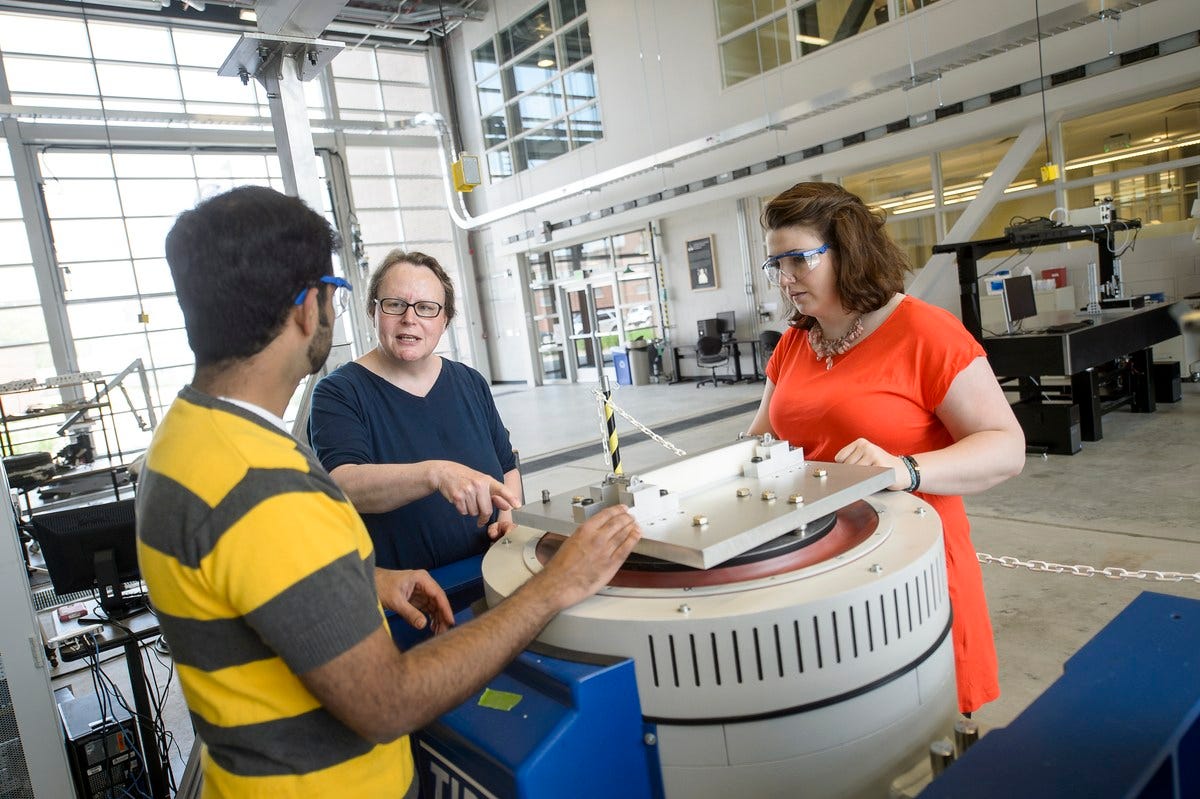Ford Taps Purdue to Help Navigate New Auto Industry
 A Purdue professor and graduate students prepare a vibration experiment; the work will help build car seat models to optimize comfort and vibration isolation.
A Purdue professor and graduate students prepare a vibration experiment; the work will help build car seat models to optimize comfort and vibration isolation.
Subscriber Benefit
As a subscriber you can listen to articles at work, in the car, or while you work out. Subscribe NowFord Motor Co. believes the traditional automotive business model is evolving. While the company says consumers buying a car and driving it themselves will persist, an emerging transportation model champions shuttles, car-sharing and smart urban transportation systems—with the end game being autonomy. Ford is hungry for innovative ideas being developed outside its walls—and that’s why the auto giant hand-selected Purdue University to help blaze the trail.
“Ford is working very hard to figure out where we can most effectively play and win in that emerging market, in addition to remaining very strong in the existing market most of us are familiar with, where you buy and drive your own car,” says Ford Global Manager for External Alliances Ed Krause.
One strategy for finding its way in the evolving auto industry involves partnering with universities throughout the world. Purdue and Ford have worked together for many decades, but are now launching a research and development alliance to deepen the collaboration. Purdue leaders say past work operated on “a project by project basis,” but the alliance now involves more comprehensive, longer-term projects.
“That makes it worth the time of our faculty and [Ford’s] engineers and scientists to work very closely together to co-develop projects,” says Purdue Chief Corporate and Global Partnerships Officer Dr. Dan Hirleman. “The alliance is a long-term commitment to just a small number of university partners—about 10—rather than the field of competition being 200 or 300 universities.”
The partnership represents an ongoing evolution in the automaker’s philosophy. Krause says, historically, Ford was “possibly the most vertically-integrated manufacturing company ever.” The Ford River Rouge Plant in the Detroit area once employed 100,000 people and for decades was the largest integrated factory in the world.
“Iron ore, coal and wood would go in one end, and cars would come out the other,” says Krause, “but, over time, that intensely vertically-integrated model had to evolve.”
Krause notes the company now seeks “world-class expertise,” both internally and, increasingly, externally.
“Ford, in recent decades, has been one of the leaders in recognizing that no matter how big or vertically-integrated you are, more and more of what companies need to compete and win is being developed outside our own walls,” says Krause. “Working with world-class partners—universities being very important among them—is essential.”
Likewise, Purdue says Ford’s market knowledge informs its research, and ultimately steps on the gas when it comes to commercializing university discoveries.
“Working with a leading company like Ford brings the most current problems and the most futuristic directions that the companies are thinking about. That’s great for our students to be entrained in leading-edge research as part of their graduate studies, which means they’re prepared,” says Hirleman. “Additionally, a quarter of our research funding at Purdue comes from the private sector, so that means, roughly, a quarter of our grad students and the equipment they use is funded by the private sector.”
The first phase of project proposals is now underway; Ford is considering about 60 ideas from Purdue, with areas of focus ranging from autonomous systems to the psychology of ride-sharing. While Ford is “particularly impressed” with Purdue’s strengths in NVH (noise, vibration and harshness) and composites, Krause says the school’s breadth of expertise makes it an exceptional partner.
The automaker is now match-making experts at the university, and will be selecting teams and projects to help map its journey in an evolving automotive industry.
Krause says Purdue’s strategy for working with the private industry is exceptional.
Hirleman says student involvement in the research also benefits Ford.
